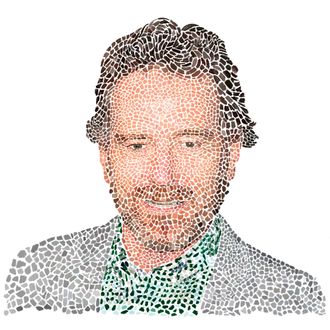
“Mad as hell” is something Bryan Cranston has always played convincingly on stage and screen, from Breaking Bad’s Walter White to LBJ in All the Way. And so it’s almost too obvious to cast him as the raving TV news host Howard Beale in the stage adaptation of the 1976 film Network. (Peter Finch won an Oscar for the role.) It’s also almost too obvious, in this era of “fake news” and Fox News and algorithmic newsfeeds stoking our outrage for profit, to resurrect this decades-old media satire. But in its way, Network remains prescient, and with Ivo van Hove directing, it was widely praised during its run in London, where Beale’s breakdown was shown on a screen by way of the cameras scattered around the audience.
Was there any trepidation in the fact that Network is already a great movie? Why revisit it now?
If we had done it in 2015, prior to the election, I don’t know if it would’ve had that much of an impact. But in 2018, it’s just going to rock the world, because the world has changed. I do feel it is important, I do feel it’s timely, and the irony of something that was written over 40 years ago that has so much meaning now, and resonance, is not lost on me. It won’t be lost on the audience, especially in New York. We have a man as our president right now who knows how to stimulate, he knows how to manipulate, and he knows how to distract, and he knows all those things.
How do you relate to Beale himself?
He’s this depressed guy who thinks, Fuck it, I’m just gonna kill myself. You want a spectacle? I’ll give you a spectacle. He, like Trump, incites his fan base like no other can. There are similarities with Howard Beale and Donald Trump.
Did playing this role change the way you think about watching TV news?
I’m filled with anxiety right now. Every time that I focus in on the current state of affairs, my anxiety level just peaks. I’m battling the idea of how much to pay attention and be an aware citizen and how much do I need to protect my own psyche and my personal well-being. In Network, I can hyperfocus on the character. Everything going around it, and what the audience is experiencing, is not what I’m experiencing onstage. So that way I’m almost insulated by the effect of the play’s message.
Network takes such a pessimistic view of television, yet it was being on Breaking Bad, a TV show, that made your career. So is TV okay or not?
Television is a tool. It’s a great tool. You need to be able to use it and not allow it to use you. Breaking Bad was the perfect story for the television medium, because it would’ve made a terrible movie.
Van Hove has a reputation for pushing actors to the extreme, and you have a reputation for pushing yourself there too. What is it like to work together?
We found a mutual respect for each other and a fondness, and now we’re friends. He trusts me that I will attempt new things. He doesn’t work well with lazy actors. What’s different with Ivo than most directors is that he requires the actors to be off-book the first day of rehearsal.
Peter Finch couldn’t make it through two full takes of the “mad as hell” scene, it was so exhausting. And you’ll do it every night. Aren’t you worried it’ll wear you out?
I’m attracted to the big bite — I want the big role, I want the responsibility, I want to take the big risk. But I’ll be honest with you, I negotiated to do eight shows a week for two months, and then I’m gonna switch it to seven shows a week. I assured the producers that this isn’t like me trying to take advantage or game the structure and everything; this is me saying I need this for my own peace of mind.
The last time I did Broadway, it was eight shows a week for five months. I would meet other actors and read about other plays and just go, I’m never gonna be able to see those, because we’re all off on Monday. I thought if I do this again, which I know I wanted to, I’m gonna just do seven.
You’re getting a lot of movie roles. Why make the time to do theater?
What’s great about doing a play is that — and I think most actors feel this way—when the curtain rises, you’re into it. I don’t feel tired at all when I’m doing the play. When you’re actually performing, I prefer the theater, because you are telling a complete story every night, and the audience will tell you if they understand it.
*This article appears in the September 3, 2018, issue of New York Magazine. Subscribe Now!


